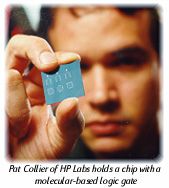
|
The day is coming when a molecular computing (moletronics) system that you configure by the way the rings on your fingers are arranged
will hold more computing power than your desktop computer.
Moltron os.1
This Moletronics Operating System (MOLTRON) will link you to the world through A/V glasses and snap-block-tile like components that you arrange to suite your computing needs. Click the button atop the ring on your right hand and download your e-mail - or just say "mail". Welcome to MOLTRON.
Will the "Mole Hole" replace "Silicon Valley"?
Go to  participatory/news for this topic. participatory/news for this topic.
Image what a new electronics industry like Molecular Electronics would mean to the developing countries of the globe. They could skip a generation or two of computer industry infrastructure investment and leap right around the next curve. Providing their country and the world with inexpensive computing.
Read the briefs below and follow the hypermedia links on a wild Mr. Toads ride to a new place in time where the larders are filled with computer
components that you use to build your favorite computing dish.
What would you snap together with your Moltron os.1 erector set?
Go to  poll. poll.
Thank you Wired magazine for the article Molecular Electronics will Change Everything, July 2000 that alerted me to this revolution. As
you can see from the resource links below the revolution is at least two years old and building momentum!
Who, What, Where:
Chemist Mark Reed,"Molecule-sized Switches, Promise Computing Leap," International Herald Tribune, July 17, 1999
"This field [molecular electronics or "moletronics"] is still in its infancy. But the results are starting to come in faster. Over the last five years, we've come from an incredible idea to the point where we might be able to do something."
Scientists' find vastly enhances computer memory - November 8, 1999:Computer storage capacity can be vastly increased using a molecular memory based on a single molecule, a research team from Yale and Rice universities has discovered... Read more...
Yale Research Team First to Describe Molecular-Sized Memory - Discovery has Implications for Drastically Reducing Cost of Computer Memory - November 1, 1999: The single molecule memory effect is more robust in storing information than conventional silicon memory, which is typically 'dynamic random
access memories' (DRAM). The single molecule memory has a life approximately one million times longer than DRAM, which is not capable of
holding stored charges for long... Read more...
Leader in Molecular Electronics Joins Rice - October 7, 1999: Much of what he spends his time thinking about is how to build a molecular computer, one of his areas
of research.... Read more...
Hypermedia References:

Hewlett-packard Laboratories - June 2000: Pushing the Limits: Stan Williams Talks about Molecular Electronics. Stan Williams and his team at HPLabs are working at the very edge of what is physically possible. Their groundbreaking research into molecular-scale electronics is intended to provide vast improvements in computing power efficiency for the era around 2010, when silicon-based integrated circuit technology reaches its limit... Two years ago, Labs scientists created a computer architecture that can function even if the integrated circuit isn't perfect. That's essential for nanometer-sized computers to become a reality, because it's impossible to build things perfectly on the nanometer scale... Read more...
Hewlett-packard Laboratories - July 1999: HP Labs scientists are building computer chips in a whole new way. From this page access other HP references and news coverage. A team headed by chemist Stan Williams and computer architect Phil Kuekes has created a molecular-based logic gate. Logic gates are a basic building block of all computers. Eventually, the researchers hope to build entire memory chips that are just a hundred nanometers wide, smaller than a bacterium... These molecular computer processors could wind up in wristwatch-sized supercomputers, woven into clothing or even in fingernail polish... Read more
Nanofabrication and Molecular Self-Assembly - March 5, 2000: Within the last decade, an entirely new kind of synthetic organic chemistry has been developed based on the use of molecular self-assembly. Lithographic techniques (i.e., ways of reproducing structures from a master, as in printing or etching) have been adapted from semiconductor and solid state electronics methodology in order to prepare assemblies on surfaces with nanometer-scale features. A combination of chemical self-assembly with this new lithographic technology has made it possible to produce biocompatible surface structures on a nanoscale (i.e., close to the size of natural biological systems).... Read more...
Kurzweil Keynote Focuses On Future: Now we're working on molecular 3-D computing, he said. The next step? Deploying "nanobots" -- minuscule emissaries that explore the neural terrain of the human brain, Kurzweil said. Connected to a wireless LAN, these microscopic devices will compile and download information to the outside world. "We'll have biologically inspired models," said Kurzweil. "Then we can create similar functionality in electronic systems."... Read more...
Molecular Computing Elements Gates and Flip-Flops - May 1998: Patent application... Read posting...
Keep up with this topic:
If you have comments or news regarding this topic please post them at our forum...  Silicone Is Dead [discussion] Silicone Is Dead [discussion]
Go to  participatory/news for this topic. participatory/news for this topic.
Search Results of Interest:
Keyword: "Moletronics" Tiniest Circuits Hold Prospect of Explosive Computer Speeds
Keyword: "Moletronics" Definition
Read about the "Moldies":
Software by Randy Rucker (1982) (Amazon.com)
Freeware by Randy Rucker (1997) (Amazon.com)
Realware by Randy Rucker (2000) (Amazon.com)
|

|


